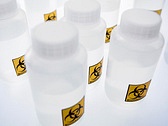Of Mice and Men: How BPA Makes Men Less Attractive

The unversity study found that male deer mice exposed to BPA through their mother’s diet exhibited compromised spatial learning abilities, a dominant trait exhibited in males. So these BPA-exposed males had a harder time finding females in the laboratory. To quote the researchers:
The disruption of male spatial cognition and the supporting brain systems would severely compromise the ability of the male deer mice to find mates in natural settings, and even if they did locate females, such animals would seem to be less likely to be chosen as mates than males that had not been exposed to BPA.
And, perhaps most disturbingly, both BPA-exposed and control females preferred the clean males to BPA-exposed males. BPA-exposed males were rejected 2 to 1 by the females in the study. In very simple language, BPA makes male deer mice less attractive to the female deer mice.
We’ve seen BPA and plastics linked with breast cancer, infertility and early puberty in females. Now we’re seeing it affect men’s brains and our attractiveness as well.
Even noted author John Steinbeck couldn’t have imagined this link between mice and men.
Of Mice and Men: How BPA Makes Men Less Attractive Read More »

